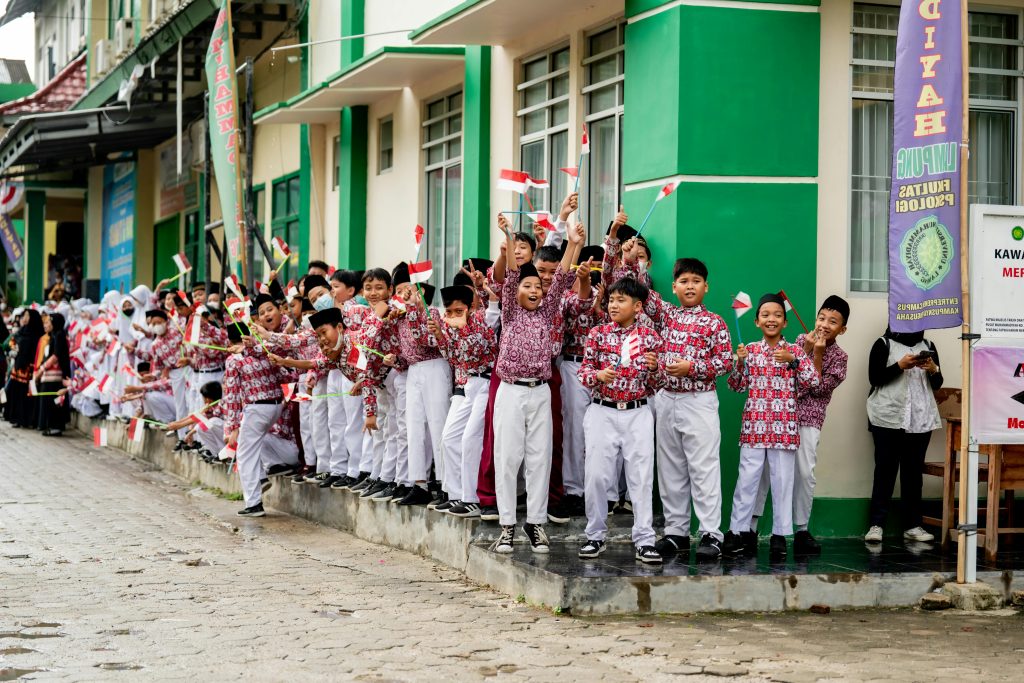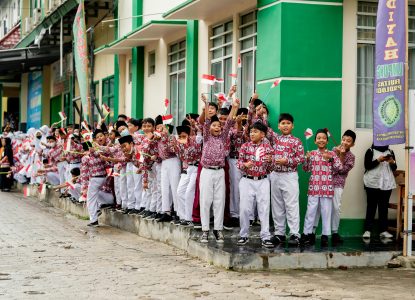By Katherine Marshall, Vice President, G20 Interfaith Association
These remarks were delivered at the International Conference on Cross Cultural Religious Literacy: Multi-faith Collaboration in an Inclusive Society, held in Jakarta, Indonesia.
– – –
If there is one topic on which development specialists almost everywhere would agree education is development’s first, top priority. And the second priority? Also education. And third? Education. In short, many transformations that we see in the world as education and literacy have expanded are linked to vast expansions of access to education. The extraordinary hope of seeing a world where every person, every child has the opportunity to develop their skills, is tightly linked to education.

Religious literacy needs to be grounded in education. It touches on sensitive issues around values and religious matters. Looking to examples of such change can be helpful. Reforms in education have been achieved with enormous efforts that have involved shifts that once were seen as unimaginable. One of the most significant is the sharp global focus on the education of girls; transformations across the world have happened because of a clear agreement on the priority of increasing girls’ education, based on solid evidence of benefits and a focus on rights and inclusion. Changes have involved multisectoral leadership that promoted changes in norms and practice.
Norms that long kept girls out of school could be seen as an especially difficult issue, a “wicked problem”, thus an especially tough, prickly challenge. Religious literacy has some similarities. Reforms in education approaches and systems that focus on religious literacy involve norms and historic sensitivities and thus need to be approached with wisdom, courage, and solid evidence. The aim is to ease tensions (including violent manifestations), strengthen social cohesion, reduce ignorance, address misinformation, and encourage positive and strategic religious engagement. Insensitive religious engagement can divide and evoke emotions that bruise relationships. At issue is also is the historic divide between secular and religious actors on development issues, as many prefer to avoid dialogue and engagement where religion is concerned. How do we deal with these challenging questions in society, in our education systems? What approaches to religious literacy can further these goals?
Societies and education systems all over the world are grappling with these issues, with wide differences among them. They are the focus of this conference because of Indonesia’s willingness to engage and creative approaches to the “wicked problems” at stake. Indonesia offers examples (CCRL among them) that have worldwide application, on topics that belong squarely the global agendas. Indonesia’s courage and determination to address some of these very difficult questions is an inspiration.
Let me tell three quick stories to give a more live idea, glimpses of what’s involved.
- In a previous job, I brought together a faith leader (Christian) and an education specialist from the World Bank, looking towards collaboration. The religious leaders started with discussion of a theological training program with Al Azhar university. I saw my education colleague turning off; he reached for his cell phone, seeing no relevance whatsoever in a program that dealt with theological education. Trying to turn the subject, I asked how he was dealing with reforms of curriculum. When he answered that their goal was a values free curriculum, the priest blanched in horror. Clearly, there was no communication between the two, as they were talking in different worlds. By values free education, the education specialist meant without ideology and away from rote learning, whereas the other had both a different agenda and very different language. The common divide and difficulty of integrating religious dimensions in policy discussions was evident.
- A second story: in many different consultations we have organized about how religion and development can cooperate, concerns about secular education comes up frequently; secular education is widely seen as failing to deal with values and therefore the model of secular education can be seen as an anathema, that even contradicts the kinds of education that many religious figures see as essential. Much dialogue about global education focuses on issues of adaptation to markets. Civic education can be a bridge but tensions around what values mean in education are linked to fundamental questions about its very purpose. Often the conversation remains stuck there.
- My third case is a report I reviewed: a country diagnostics study by the World Bank, over 800 pages long. My word searches on religion, Islam, Christianity, and more turned up zero—absolutely no mention.
This dichotomy between worlds, between the secular and the religious, is a central problem that religious literacy aims to address. Divergent approaches and hesitations in building bridges across the divides are, as we heard so powerfully through the morning’s discussions, harmful and unnecessary. Engagement is absolutely essential, because they are both important and intimately linked.

Discussions about education, religion, values, and culture, however vital, are not easy. It’s a wicked problem, where we need all of your wisdom and help. This true at the global level, the G20, for example, and far closer to home.
In working towards solutions, let me outline five important topics..
- We know that diversity is a powerful force for good. We also know that the world is becoming more diverse. We also know that managing diversity in the short term is problematic and difficult. Many societies, many political entities, face challenges in doing so. We would hope to see thoughtful approaches to understanding diversity integrated throughout education systems and curricula. But again, that is easier said than done. The CCRL offers interesting models precisely to that end.
- We are living, as we were reminded, in a world with many tensions and divisions, so we cannot approach these issues without facing the reality of divisions and conflicts. We speak of moderation as a norm and a goal. But we’re not looking for tepid moderation. We want instead a creative, passionate, provocative moderation, people who believe in bold goals, and new paths. CCRL offers ways to build this kind of approach to informed, robust moderation.
- Many different levels in thinking about education and religion are involved, including specifically the challenge of supporting an informed and contextual religious literacy. We need therefore to engage teaching about religion in schools run by religious institutions and in public schools, linking it thoughtfully to the efforts to teach religion itself and underlying beliefs and values. Education of future religious leaders to address social cohesion and development is another important if often neglected issue.
- We need to focus more on the roles of religious actors and leaders in thinking about these education issues, looking to address the stereotypes and misconceptions as well as shared values and differences that can divide secular and religious approaches.
- Religious literacy is linked to lifelong learning, something we all know and appreciate is the current but even more future reality. All of us need to be reeducated all the time. Religious literacy is not only about teaching in schools and universities. It applies to political leaders, bureaucrats, parents, judges, school superintendents, and so on. Here too, models well adapted to context and needs are needed.
Those five points are suggestive of ways to address the complex and difficult task of bringing these worlds closer together, in constructive ways. Models like CCRL and various ethics education programs like the Pancasila Student Profile and Arigatou International’s ethics program offer us many clues about directions we can take.
– – –
Katherine Marshall is a senior fellow at the Berkley Center for Religion, Peace, and World Affairs at Georgetown University. She serves as the vice president of the G20 Interfaith Association and executive director of the World Faiths Development Dialogue, and worked at the World Bank from 1971 to 2006, tackling development issues in the world’s poorest countries.


